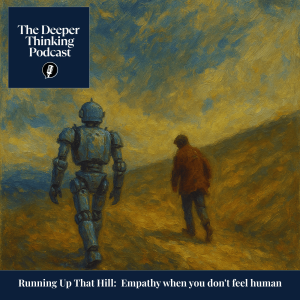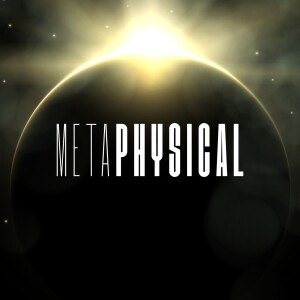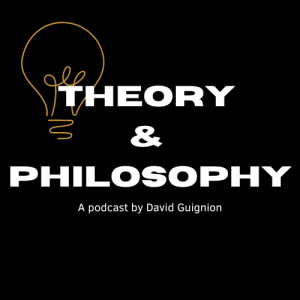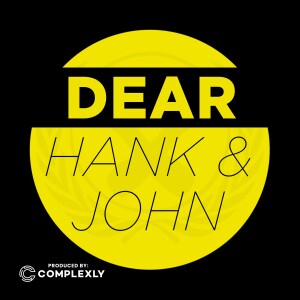

Running Up That Hill: Empathy When You Don't Feel Human
The Deeper Thinking Podcast is digitally narrated
For anyone navigating emotional intensity, neurodivergence, and the cost of deep connection.
How do we keep showing up for others without losing ourselves? This episode explores the cycles of empathy—its vitality, its drain, and its quiet power to heal. We move through the paradoxes of connection and exhaustion, especially in neurodivergent experience, where attunement can feel both sacred and overwhelming. This is a meditation on porousness, care, and the practice of self-compassion as a moral resource—not a luxury.
Anchored in the music of Kate Bush, Joy Division, and Bill Callahan, we reflect on how emotional resilience emerges not from hardening but from staying soft—staying near. We draw on insights from neurodiversity, empathy theory, and the ethics of care to ask: what happens when empathy becomes too much—and how do we return to it without collapse?
This is not a celebration of constant attunement. It’s an honest reckoning with the fatigue of feeling, and a slow reclaiming of inner life when the world becomes too loud. From overstimulation to emotional saturation, we explore how the struggle to stay open also reveals the depth of our humanity.
Reflections
This episode gives language to the invisible labor of empathy. It suggests that survival and sensitivity need not be opposites—and that burnout can be a site of return, not just retreat.
Here are some other reflections that surfaced along the way:
- Empathy isn't just felt—it’s metabolized. And that takes energy.
- Being overwhelmed doesn’t mean we’re failing. It means we’re porous.
- Neurodivergent sensitivity is not fragility. It’s depth with thin skin.
- Self-compassion isn't an escape from others. It’s what lets us return to them intact.
- Feeling too much can be a form of wisdom—one we’re rarely taught how to hold.
- Silence can be restoration. Withdrawal can be sacred pause.
- We don’t repair through more giving. We repair through boundaries that honor the body and the psyche.
- Empathy is not always noble. It can be messy, envious, collapsed—and still real.
- In the end, staying human is harder than it looks. But worth it.
Why Listen?
- Explore the links between empathy, overstimulation, and emotional exhaustion
- Understand the ethical and psychological costs of deep feeling
- Reflect on the music of Bush, Callahan, and Joy Division as emotional cartographies
- Engage with the lived experience of neurodivergent perception and care
Listen On:
- YouTube
- Spotify
- Apple Podcasts
Support This Work
If this episode met you where you are, you can support the continuation of the work here ($4) Buy Me a Coffee Thank you.
Bibliography
- Bloom, Paul. Against Empathy. Ecco, 2016.
- Walker, Melanie. Self-Compassion: The Proven Power of Being Kind to Yourself. HarperWave, 2015.
- Baron-Cohen, Simon. The Science of Evil: On Empathy and the Origins of Cruelty. Basic Books, 2012.
Bibliography Relevance
- Paul Bloom: Challenges idealized views of empathy, offering critical nuance.
- Kristin Neff: Offers foundational research on the power and necessity of self-compassion.
- Simon Baron-Cohen: Maps empathy scientifically and explores its dysfunctions and deficits.
Empathy isn’t endless. But when we learn to rest, it can begin again.
#EmpathyFatigue #Neurodiversity #EmotionalExhaustion #KateBush #BillCallahan #JoyDivision #SelfCompassion #MentalHealthMatters #TheDeeperThinkingPodcast #EmotionalResilience #BoundariesAndCare #MusicAndMind
More Episodes
All Episodes>>Create Your Podcast In Minutes
- Full-featured podcast site
- Unlimited storage and bandwidth
- Comprehensive podcast stats
- Distribute to Apple Podcasts, Spotify, and more
- Make money with your podcast












